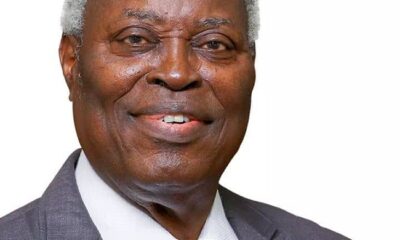Headline
Nigeria can only be delivered by leader with good intention – Kumuyi

The General Superintendent of Deeper Life Bible Church, Pastor William Kumuyi, says it takes a person with good intentions, backed up with effective action, to deliver the country from the present economic challenges.
The Convener of the Global Crusade with Kumuyi (GCK), made the assertion while addressing a news conference on Wednesday at Ogbomoso, Oyo State, to flag-off the July 2023 Global Crusade with Kumuyi.
He said that throughout history, nations and communities that faced severe economic crisis, rebounded as a result of an individual with drive and determination to turn things around.
The GCK convener said it took a person with purpose and great ideas, put into action, to achieve positive results that alleviate the sufferings of the people.
Kumuyi called on Nigerians not to lose hope with the present situation in the country, assuring them of greater possibilities ahead, if only they could pray, plan, and pursue their endeavours in order to make a difference in the nation.
He appealed to youths not to be intimidated by the current economic challenges and urged them to wake up and pursue their goals with determination and diligence.
“”Don’t let anyone tell you that we are down.
“Look at the economy, look at petrol, prices are going up higher and higher; no it takes you to wake up and with faith in God; we can do something,” he said.
On what motivated him to hold the global crusade in Ogbomoso, Kumuyi said it was based on his passion and determination to make a difference in the lives of the people, using Ogbomoso as a platform to reach out to the over 180 countries, where the GCK covered.
Kumuyi enjoined the people of Ogbomoso, including the youth to turn out en masse for the crusade, which included the Impact Programme for the youth and the Ministers Conference, as great possibilities awaits them.
Headline
Fagbemi warns against obstructing EFCC from performing its lawful duty

The Minister of Justice, Lateef Fagbemi, SAN has warned against obstructing the Economic and Financial Crimes Commission (EFCC) from carrying out its lawful duty .
Fagbemi’s warning is contained in a statement in Abuja.
“This is a matter of very grave concern, it is now beyond doubt that the EFCC is given power by the law to invite any person of interest to interact with them in the course of their investigations into any matter, regardless of status.
“Therefore, the least that we can all do when invited, is not to put any obstruction in the way of EFCC, but to honourably answer their invitation.
“A situation where public officials who are themselves subject of protection by law enforcement agents will set up a stratagem of obstruction to the civil and commendable efforts of the EFCC to perform its duty is to say the least, insufferably disquieting’’.
He added that running away from the law will not resolve issues at stake but only exacerbate them.
“Nigeria has a vibrant judicial system that is capable of protecting everyone who follows the rule of law in seeking protection.
“I therefore encourage anyone who has been invited by the EFCC or any other agency to immediately toe the path of decency and civility by honouring such invitation instead of embarking on a temporising self-help and escapism.
“This can only put our country in bad light before the rest of the world’’.
He said institutions of state should be allowed to function effectively and efficiently.
“I stand for the rule of law and will promptly call EFCC, and indeed any other agency to order when there is an indication of any transgressions of the fundamental rights of any Nigerian by any of the agencies’’.
NAN reports that the EFCC had on Wednesday warned members of the public that it was a criminal offence to obstruct officers of the Commission from carrying out their lawful duties.
Section 38(2)(a(b) of the EFCC Establishment Act makes it an offence to prevent officers of the Commission from carrying out their lawful duties. Culprits risk a jail term of not less than five years.
The warning , the EFCC said, became necessary against the background of the increasing tendency by persons and groups under investigation by the Commission to take the laws into their hands by recruiting thugs to obstruct lawful operations of the EFCC.
On several occasions, the anti graft agency said, operatives of the Commission have had to exercise utmost restraint in the face of such provocation to avoid a breakdown of law and order.
Headline
Unknown Gunmen Abduct Channelstv Reporter In Port-harcourt

Some unknown gunmen have kidnapped Joshua Rogers, the ChannelsTV reporter in Port-Harcourt, the Rivers State capital.
Politics Nigeria learnt that Rogers was picked up close to his residence at Rumuosi in Port Harcourt and to an unknown destination by the gunmen around 9pm on Thursday, April 11.
The reporter was driving his official ChannelsTV branded car when the hoodlums accosted, pointed a gun at him and took him away in the same vehicle.
Rogers was said to be returning from his official assignment in Government House after a trip to Andoni for a government event when the incident happened.
Already, the gunmen were said to have contacted his wife and demanded a N30million ransom for bis release.
His cameraman confirmed the incident and appealed to his abductors to set him free unconditionally.












